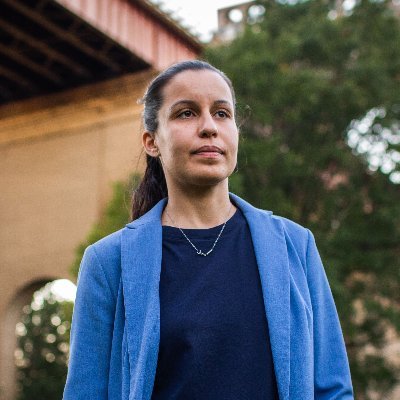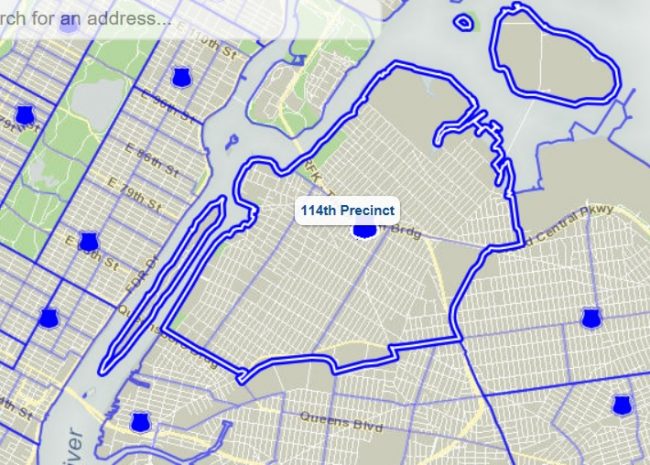
Council Member Tiffany Cabán took to Twitter Monday to denounce the impending deployment of plainclothes units in the 114th Precinct (Photo: Instagram @cabanforqueens)
Feb. 8, 2022 By Michael Dorgan
The NYPD 114th precinct in Astoria is about to see a return of the plainclothes police team—but a local council member is opposed to these units saying they are ineffective and unfairly target minorities.
The precinct is one of 30 across New York City where plain-clothes units will soon be deployed as part of the mayor’s plan to crack down on illegal guns and major crimes. The 30 precincts are where 80 percent of the city’s violent crimes are reported, according to Mayor Eric Adams.
The plainclothes units — which were disbanded in 2020 by former Mayor Bill de Blasio—are expected to be back on the streets later this month with a focus on gun violence. Adams is deploying the teams amid surging crime rates across the five boroughs.
In the 114th precinct alone, there were 10 murders in 2021 compared to seven in 2020 and two in 2019, according to NYPD data.
Council Member Tiffany Cabán took to Twitter Monday to denounce the impending deployment of plainclothes units — saying they did not work in the past in reducing crime and that the unit tormented minorities using stop-and-frisk tactics.
“It’s time to abandon the failed strategies of the past,” Cabán said in a statement posted to Twitter Monday.
“Roughing black and brown kids up, throwing them against walls or into the streets, surveilling and harassing our Muslin neighbors, making low level arrests to feed the pipeline of mass incarceration and cycles of criminalization and trauma – these [policies] didn’t make us safe before, and they never will.”

114th Precinct boundaries (Astoria and Roosevelt Island)
Cabán represents District 22, much of which falls under the 114th Precinct. The precinct also includes the Astoria, Woodside, Ravenswood and Queensbridge Houses – NYCHA complexes where there have been several shootings in the past two years.
The progressive lawmaker, who ran for office on a “defund the police” platform, said that the 114th Precinct has historically had one of the highest stop-and-frisk rates in the city, citing NYPD data. The 114th Precinct had 242 incidents in 2019, which was the greatest number of stops of any of the 16 precincts in Queens that year.
The units, Cabán said—citing a 2018 study by The Intercept—were responsible for nearly one-third of all fatal shootings involving police from 2000 to the time of the study, despite making up around 5 percent of the entire police force.
“We have to get serious about achieving the public safety outcomes we all want, need and deserve,” Cabán wrote in the statement.
Unlike the disbanded units, the plainclothes teams will be equipped with body cameras and will wear something identifying them as police, Adams said last month. The officers, however, will not wear uniforms and will travel in unmarked vehicles.

The 114th Precinct in Astoria (Photo: Queens Post)
Nevertheless, instead of plainclothes units, Cabán said a better strategy would be to invest in the city’s “Crisis Management System,” as a means of reducing violence in the community. The system consists of a network of nonprofits that mediate conflicts in local neighborhoods before they turn violent.
Cabán cited a citywide study which found that the system helped reduce shootings by up to 40 percent in areas where it was implemented between 2010 and 2019.
“This approach is viable, it’s proven, and it’s waiting to be scaled up,” Cabán wrote. “All it needs is deeper investment from City Hall.”
Cabán ended her statement by encouraging her constituents to get trained in de-escalation tactics and to familiarize themselves with their rights should they be stopped by police. She urged residents to reach out to her office or The Legal Aid Society if they feel their rights have been violated.
“We are here for you, we are here with you,” Cabán wrote.
“We know that a safer, healthier city is possible. We will never stop fighting for that city.
The plainclothes unit is coming to District 22. Here’s what you need to know, with citations downthread: pic.twitter.com/OVcQ5glG6y
— Council Member Tiffany Cabán (D22) (@CabanD22) February 7, 2022
